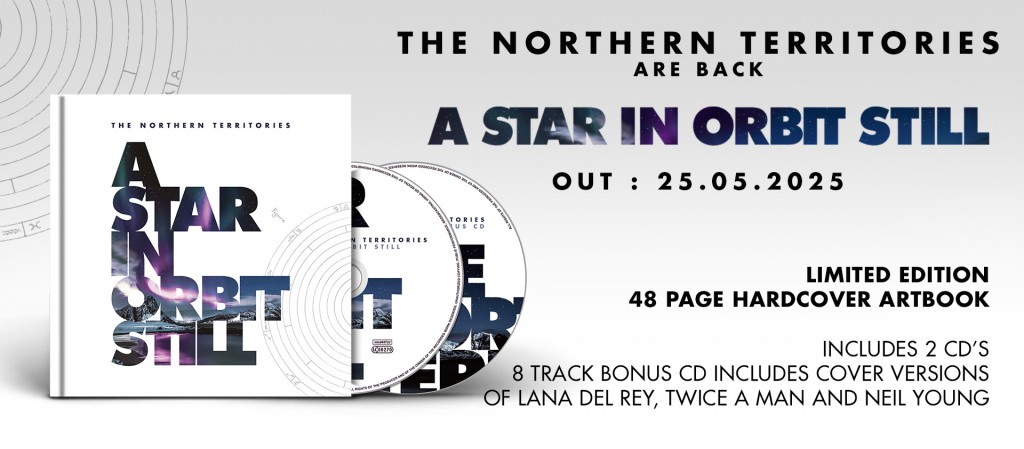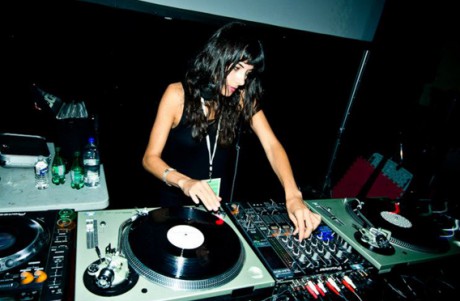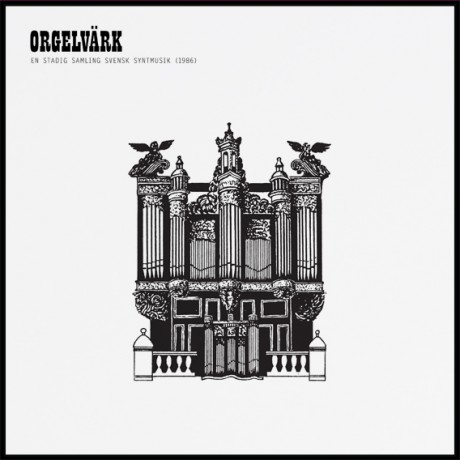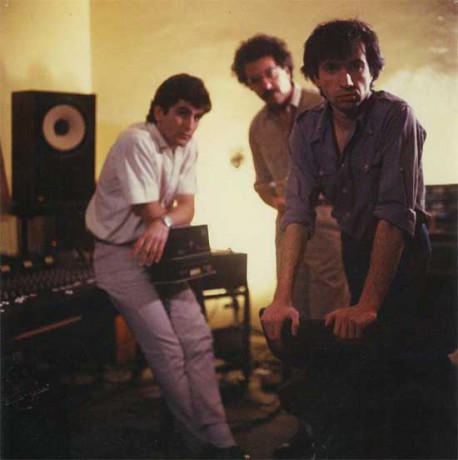
Around 2005 I was really bored with electronic music. Nothing was new and exciting anymore and I just felt a need to explore and to find something new, something that reminded me of why I once became an electronic music fan. I discovered the New York based label Minimal Wave, which started to release old obscure tapes and giving them new life on thick vinyl.
We are talking about a minimal electronic sound, done with simple drum machines and synthesizers, very much in the spirit of new wave or coldwave. It is a DIY-movement and a lot of the products are even released on tape instead of vinyl.
In Release Magazine’s early years, in the late 80:s and early 90:s, we covered some the music Minimal Wave is digging up today. Release was very much about the electronic underground scene and it is fascinating to see how a New York label explores this old scene today.
My record collection has been stacking up with releases from the Minimal Wave label, so when I got the news that Veronica Vasicka, the mastermind behind the label and radio show, was coming to Sweden to do a DJ-set, I quickly booked an interview. I discovered Veronica was laid back, easy to talk to and perhaps most of all; has a huge heart for electronic music. Welcome to the world of Minimal Wave.
Young Throbbing Gristle fan
So if we start from the beginning, when did you first discover electronic music?
- When I was a teenager my older brother had some cassette tapes so that’s how I first heard new wave music. There was also a radio station that I listened to, and I would make my own mix tapes from the radio. I was 12 years old when I started doing that. I also had a Casio SK1, a sampling keyboard, which was really influential for me.
I read that you were into Throbbing Gristle for a while.
- Yeah, a couple of years later when I was 15 I got really into Throbbing Gristle. I worked at a record store and just learned a lot about more underground stuff. I had all these VHS-tapes of Throbbing Gristle live and I was also listening to SPK, Cabaret Voltaire and Fad Gadget. A lot of Mute releases. This was a big turning point for me. I was also really into Death in June and Current 93.
Was it hard to find this mostly European music in New York?
- Yeah, I wasn’t really aware if it was rare or not, because I worked at a record store which happened to get a lot of this stuff, so I just found it as it arrived.
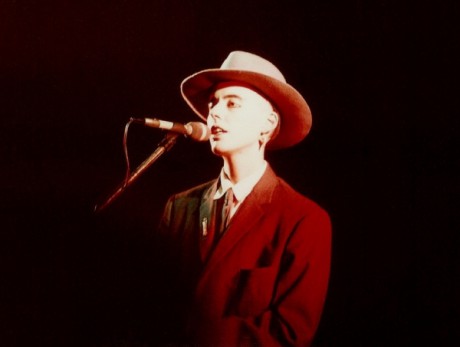
Oppenheimer Analysis live in London 1983.
So if we move forward a bit, what were your first findings in this world of Minimal Wave?
- On a more obscure or deeper level it was Oppenheimer Analysis, the first band that I released. There were a lot of other bands that I was into at the time, like this Dutch project Sluik. These where all people that just made 50 to 200 copies of their tapes so this was definitely going deeper than what I had listened to in high school, but it was still along the same lines.
But Oppenheimer Analysis was a big turning point when I realised that this music was totally accessible to people, but it hasn’t gotten there yet, it wasn’t given the chance in 1982, so it should have that chance again.
Was this around 2003 when you started the radio show?
- Yeah, around that time.
So lets talk a bit about the radio show, how did that start?
- Well I was one the founders of the station and all of us founders had radio shows. I decided to specialise myself, and at first the show was called Minimal Electronic Plus, because I wanted to expose more of that music to people. The show was 2 hours per week, so it was a lot of content. This actually made me search for more and more music because I didn’t want to repeat what I played. This led to the first release of Minimal Wave.
The birth of a record label
When you decided to start the label, did you ever think that it would grow this big?
- No, I didn’t really have a vision for the future of the label, it happened very naturally from one release to the next.
But when you started you just wanted to release ”The Devil’s Dancers” by Oppenheimer Analysis to people?
- Yeah, I had played it at a bar night and people were dancing and getting really excited about it so I just thought that it needed to be released.
Was it a tough step to take, to actually start a label?
- Well, I didn’t really know anything about pressing plants, I had never really done a lot of graphic design, I was trained in photography, so it was all very much an experiment, like designing the cover, getting the mastering done and getting the pressing. It started out just as an experiment.
In my world, in my journey into this world of alternative electronic music, Minimal Wave was really the first label that started to re-release old stuff on vinyl. Do you agree with that, that you sort of started that wave?
- Yeah, I think so, sort of. There were a couple of other labels, there was Genetic Music in Germany who was already around and was really inspiring when I started. I thought that they were very authentic about what they were doing. These days, I don’t know, it doesn’t feel as authentic as it used to. And then Anna Logue Records from Germany also started the same year as I did so it really felt as we all were on a same level, but now it feels almost like a trendy thing to do, to re-issue old music. There are just so many labels that are doing it now.
Swedish tape gets new life
2011 you released the Swedish Neuköln Records compilation ”Orgelvärk”, an old tape release that’s sort of a holy grail among collectors. Tell me a bit about the work with that.
- Well I think that originally Jan (Svensson, Börft Records) had released some records with 18:e Oktober, and then I made the connection. I have a friend in New York, I don’t remember how we got a copy of the tape, but we had a copy and we were all listening to it. This must have been 2003 or 2004, and then I was ordering tapes from Jan and Börft, so I made the connection to Tor Sigvardson who made the compilation and then I thought on how much I loved that comp, so I wondered if he still had the masters. I think I was shy to contact him for a while because he had all these projects, besides from 18:e Oktober, he was in all these other projects I was discovering, it was like him, him, him. And I was just thinking that he was doing so much stuff, but then I think I was talking to Jan about him and he put me in touch with him. So he told me about the process when he made the compilation and that he had put an ad in a newspaper and he got all these submissions and there was a lot of songs that didn’t make it to the tape. And these were really good songs, so he ended up sending me those extra tracks that never made it. So we decided that when we did the vinyl we could include some of those extra tracks.
That whole thing was so moving for me, because it was music that was made like in the middle of nowhere, in the countryside, and that’s what really fascinates me about this stuff, pre-internet people were making this without an awareness of like, someone in New Jersey that was making similar stuff. It’s really powerful; it’s just people discovering electronic instruments and being able to record at home and not needing like a big production studio. I think that for me that compilation symbolises that, an essence of DIY electronic. It’s really soulful. When I was writing the description for the website I called it electronic folk music.
Do you think that there is a different sound between different countries? Can you hear that it’s Swedish?
- Definitely, you can tell that it has it’s own character. I don’t know how to describe that specific character, it’s a bit loungey and very romantic. Of course the vocals is a giveaway, but I can hear when it’s Belgian stuff for instance, or French, Swedish, German, but I don’t know how to describe it exactly. It’s the difference in the culture, what makes the country, each culture is so different and has its specific history and that contributes in how people are approaching their drum machines and synthesizers. That cultural upbringing and what they grew up listening to, it makes a certain tone on their music.
Why do you think that the interest has grown so much, and continues to grow?
- I think ultimately it’s about good music, regardless of when it was made. If you are releasing music that speaks to people, and that is accessible, and has value, then people will want that. So as long as the product is good then it will continue to grow.
Timeless and mystical
You have said in other interviews that there is just so much out there that is waiting to be found and that you still continue to find new stuff, so how do you select what you want to release? How do you channel the good from the bad?
- Oh, it just comes really naturally; it’s not a very conscientious thing, if I come across some material that is good – that’s it really.
So there isn’t a Minimal Wave formula? Or have you found bands where you think, ”this is good, but it doesn’t fit into the model that I have”.
- Hm, no, not really. I mean, I think that it’s important to have a balance where sometimes it sounds just a bit too dated or too past, it’s nice when it stands out – maybe it could have been made yesterday, maybe it could have been made 30 years ago. When there is that mystery, I think that it’s more interesting.
It’s interesting that you said that, because before we went here me and my friend sat at our hotel room, listening to the Minimal Wave Tapes collection, and we said that it sounds old, but you can’t really tell how old. There is just something in the analogue sound that can’t be recreated today, and the reason for this I think is that bands are afraid to limit themselves, compared to the limits that these bands had 30 years ago. For them it was a natural limit, but today with a computer you don’t have limits anymore and personally I think that those limits is what creates the magic.
- Yeah, I totally agree. Because without those limitations people aren’t really forced to channel their creativity, there are just too many choices. So the spirit in it gets lost.
Detective work
So I have to ask, and this might be the big secret, but how do you find these bands so many years later?
- I don’t know, it can be anything, like writing letters or making calls. I always find that there is some connection, it can be the name of the person producing the tape, so I find that person and that leads to the artist of the tape and so on. It’s a whole process, but I just think that I have some natural detective skills, because I don’t think it’s that difficult.
Do you always have some bands that you are working on and looking to get contact with?
- Oh yeah, I’m always working with a lot of different bands at once. Right now we are working on releasing this Daily Fauli record, with Sören Fauli from Denmark, and it’s just been a process over a few years and he and I are friends now. Actually we met earlier today and he is going to recreate the history on what was going on when he recorded this record, he was only 18 years old at the time. But yeah, everything is a process where we have a lot of releases in the works at the same time. It’s important to have established a contact with the artist, so sometimes we do things more slowly because of that. Instead of just getting the rights, and then just releasing it within a month. That almost never happens.
What are some of the reactions you get from the artists?
- A lot of them are really surprised that the music had reached New York and a lot of them are just really thankful for the releases. And there are fanbases that resurface that they didn’t think they had, and suddenly they have all these fans. It’s really rewarding. But for the most part they are surprised.
So you have been doing the radio show for 8 years and the label for 10. Is it still as fun?
- Yeah! I mean, the radio show, it went through phases where I wanted to stop, since it was just a lot: 2 hours every week with new material, but then I got over it. And the label, it’s really fun, but there are periods when I think ”I can’t be releasing 80:s music for my whole life”, so I think about how it’s going to evolve, but it works best when I’m not conscious about it. When I’m just going with my intuition. Because a lot of the music has evolved, for instance I would never have released In Aeternam Vale, like those 2 12 inches that we did: ”Highway Dark Veins” and ”La Piscine”. At the start of the label I would never have put that out. So there is definitely a progression, and that’s what makes it interesting.
So where do you find the energy to continue? Is it still ”the hunt” sort of?
- I mean, it’s just, I’m really genuinely excited about music and there is always like one of my artists that lead to other things, and just establishing these relationships that seems to lead to other artists or other projects. Like Sympathy Nervous from Japan, he just sent me another few hours worth of material, and stylistically it’s different, it’s really techno but it’s just inspiring to hear how he evolves. So there is a lot of material out there.
Do you think that one day you will have found it all?
- No, I don’t think so, I think there always will be stuff that haven’t been found because there is people out there that just recorded for themselves and that was it. They maybe made a few tapes for their friends, but it didn’t get beyond that, so they remain unknown. So I’m not going to find them.
Has it come to that stage that old bands are now contacting you instead?
- Yeah. It’s not always the right match, but in some cases it has worked out.
Technological overload
I have a theory that the reason why we are into this more minimal sound again is that we are sort of overloaded with new technology.
- Oh yes, there is definitely a digital backlash. Musically things have gotten a bit complicated with digital production and technology. Then we have our everyday experience with the Internet, downloading music and such. There is just something in the beauty of simplicity in this music that just shines right now in these days.
Is this a bit of a conflict, since I know that some of your releases are available on Spotify?
- No, I don’t see it as a conflict; I see it as an extension of the release. We make what ever we can available digitally, since there is people out there that really want it, so it’s just an extension of the physical product. But it’s never the highlight; we never do just a digital release.
Sometimes you do CD?
- I’ve done two CD:s, out of 44 releases. I was trying to do CD, but I don’t really like it so we stopped.
Spotify playlist compiled by writer Tobias Eliasson
